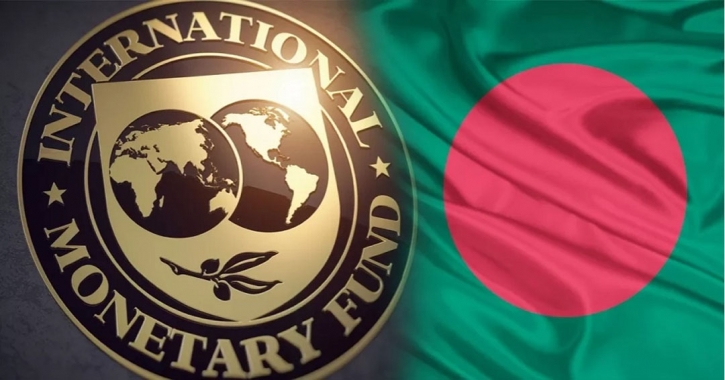
The International Monetary Fund (IMF) loan of $4.5 billion is expected to be approved for Bangladesh through the next executive board meeting of the global financial giant scheduled to be held on 30 January, as revealed by the Dhaka visit of Antoinette Monsio Sayeh, DMD and her press statement. Bangladesh and the IMF earlier reached at a decision at a staff-level agreement under the Extended Credit Facility, Extended Fund Facility, and the IMF's new Resilience and Sustainability Facility (RSF), on the basis of the receiving country’s varmint authorities' home-grown reform agenda. Sayeh observed,the macroeconomic policies taken by the Bangladeshi authorities in recent years have helped them keep inflation stable, debt-to-GDP ratio low and external buffers adequate as she said "I am very pleased to have had the opportunity to meet with Prime Minister Sheikh Hasina and Finance Minister and Governor Bangladesh. Bangladesh's impressive economic growth and social development in recent decades, marked by steady progress in poverty reduction and significant improvements in living standards, has been impacted by global shocks – first from the pandemic and then from the ongoing war in Ukraine. "We discussed the impact of these shocks on Bangladesh's economy, and comprehensive measures to ensure protection for the vulnerable during these difficult times," she added.
The long-standing challenges of raising tax revenues, and building a more efficient financial sector reforms, combined with measures to facilitate private investments and export diversification will help create conditions to make Bangladesh's economy more resilient and support long-term, inclusive and sustainable growth." the visiting DMD of IMF categorically mentioned. Besides, challenges related to climate change could threaten macroeconomic stability, climate investment needs, catalyse climate financing, and reduce balance of payment pressures from import-intensive climate investment Antoinette Monsio Sayeh visualised having visited Padma Bridge and got the salient features of Central Bank’s import policy. Bangladesh government has reached an agreement in principle with the IMF subject to formalisation following which electricity prices hiked by an average of 5 percent. The government might seek some time to implement some other IMF conditions by increasing the policy interest rate of the central bank in the process.
Bangladesh hopes to receive the first instalment of $45.45 crore IMF loan in February, if everything goes well, thereafter further one instalment will be made every six months, but the country will have to finalise the deal with IMF very cautiously in view of ongoing juncture in line with changed global scenario, financial analysts believed in accordance with the conditions of the IMF furnishing the impression of raising the loan interest rate to a limited extent.The prospective loan programme of the International Monetary Fund will prime Bangladesh for graduation from the least-developed country bracket and reach middle-income country status by 2031, said the lender's top official.
In the past decade, Bangladesh achieved impressive economic growth and social development, making steady progress in reducing poverty and across many indicators of the Sustainable Development Goals, Antoinette Monsio Sayeh, the deputy managing director of IMF, told during an interview with media stating further that the huge potential shows that Bangladesh will successfully graduate from the LDC status and achieve middle-income status by 2031,and address structural issues to accelerate growth, attract private investment, enhance productivity and build climate resilience. We believe the programme will help to do just that though the country does have around 9 percent of tax-to-GDP ratio -- at around 9 percent of GDP -- is one of the lowest in the world.
Not making sincere, proactive efforts on the revenue mobilisation front will make the going difficult for the government as it looks to meet its critical spending needs in the areas of social protection, health, education and infrastructure to create a conducive environment for growth.In a similar vein, not fixing the financial sector will have a similar undesirable outcome in the form of crowding out private sector credit allocation."Bangladesh needs a more efficient financial sector to improve credit allocation to the most productive economic sectors having vulnerabilities in the banking sector, particularly in the state-owned bank (SoBs).Structural weaknesses in supervision, regulation and governance, coupled with high defaulted loans and low capital in SoBs could be a drag on medium-term growth prospects. The authorities need to be very alert to that and take action regarding to arrest the risk of increasing defaulted loans, she envisioned.Some key reform priorities include strengthening the corporate governance of banks including the role of independent directors; resetting the classification and provisioning requirements in line with Basel standards, including the treatment of rescheduled and defaulted loans; stronger enforcement of the current prudential framework by the central bank.Legal features that allow delayed loan repayment should be addressed, and legal measures should be instituted to support stronger enforcement of creditor rights and debtor incentives to repay. Besides, reforms in monetary and financial policies such as a review of directed lending and regulated interest rates that will support the necessary strengthening of the banking sector.
Developing further the bond markets should also be a priority to meet the growing financing needs, especially after Bangladesh graduates from the LDC status in 2026.Further reforming the National Savings Certificates system and developing a secondary market for government securities will be important, she said. The government needs to retrench is in handing out subsidies to ensure sustainable and equitable growth. The people who drive cars and conditioners are better off and benefitting the most from those subsidies. Currently, a significant part of the budget is spent on subsidies and some of those subsidies are not benefiting the poor very much she remarked specifying that "Paring down those subsidies to give the government an opportunity to have more resources to spend on targeted social safety nets, to safeguard the impact of price increases on the poor is a big part of what we are looking at to make for better spending on education and health and to benefit the poor."The IMF programme is aimed at making more fiscal space and giving the authorities an ability to address the needs that are clearly important and to better serve the poor.The programme also focuses on modernising the monetary policy framework, which will promote greater macroeconomic stability and help better manage inflation. Increased exchange rate flexibility will help rebuild external resilience.
The authorities and IMF staff have worked closely on a programme that is most relevant to Bangladesh's current economic and social dynamics, she said, adding that the IMF executive board will take a call on the loan proposal on January 30."With the significant efforts already taken by the authorities, we expect very strong support." She remarked adding further the programme will lay the foundation to unlock Bangladesh's growth potential, harness its demographic dividend and support long-term, inclusive and sustainable growth.
Bangladesh has been enthused by the energy as clearly observed the commitment to taking forward the reform efforts during 2023. Since IMF's growth forecast for the global economy being only 2.5 percent, so the economy like Bangladesh will have to preserving macroeconomic stability, preventing disruptive adjustments to protect the vulnerability necessitated for policy priority to focus on further containing inflation, softening the impact of these economic disruptions on the vulnerable and building external resilience through continued exchange rate flexibility for start taking forward Bangladesh's efforts on the climate side as a part of "macro critical" observation. All these will help Bangladesh to strengthen institutions to meet climate objectives to mobilise additional climate financing and support large-scale climate investments, IMF DMD categorically prescribed. Mentionable, Bangladesh is the first country in Asia to request IMF financing under this new facility.
The writer is a senior journalist and he can be reached at mrbpress@gmail.com





































